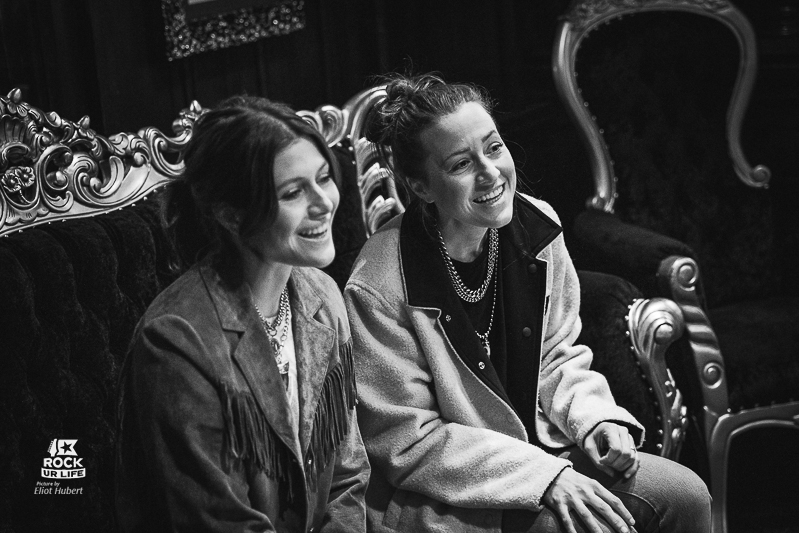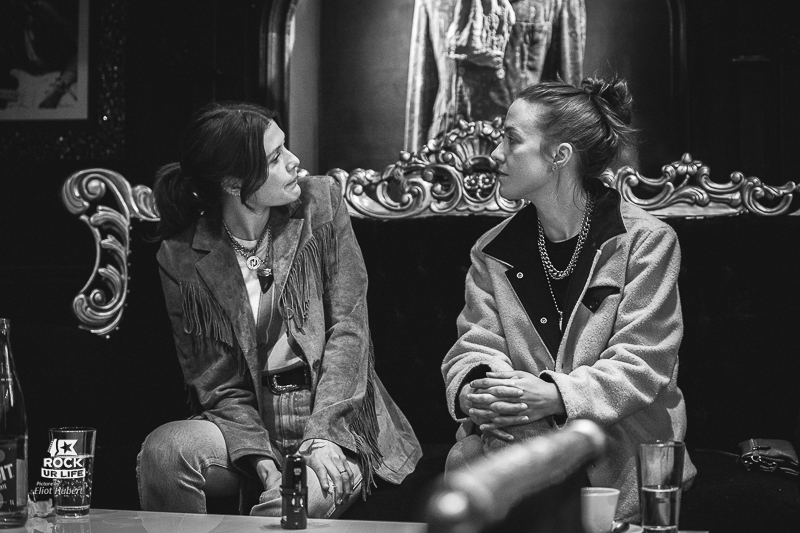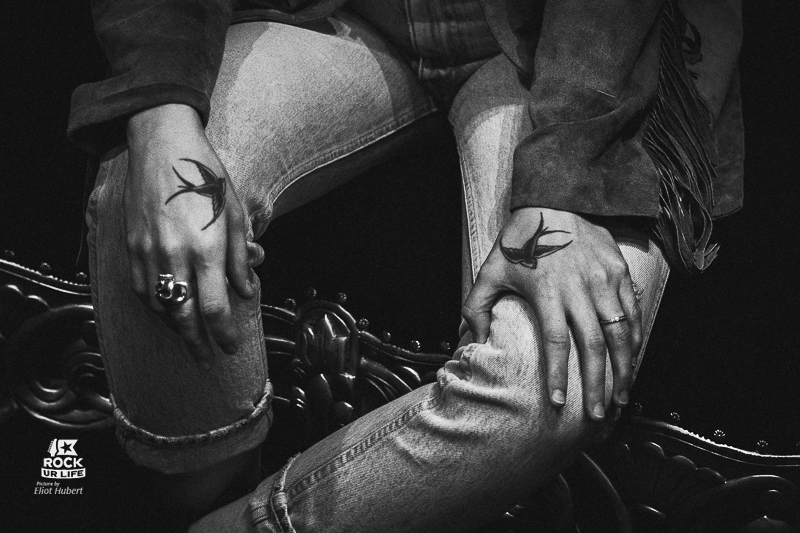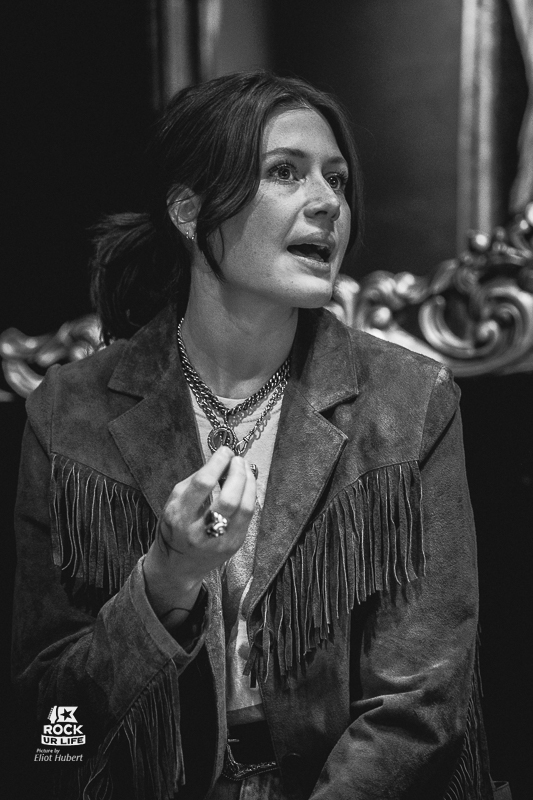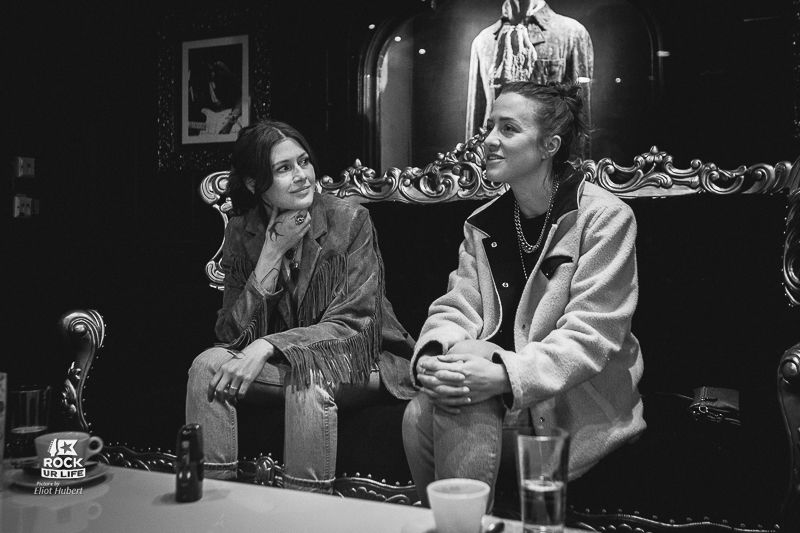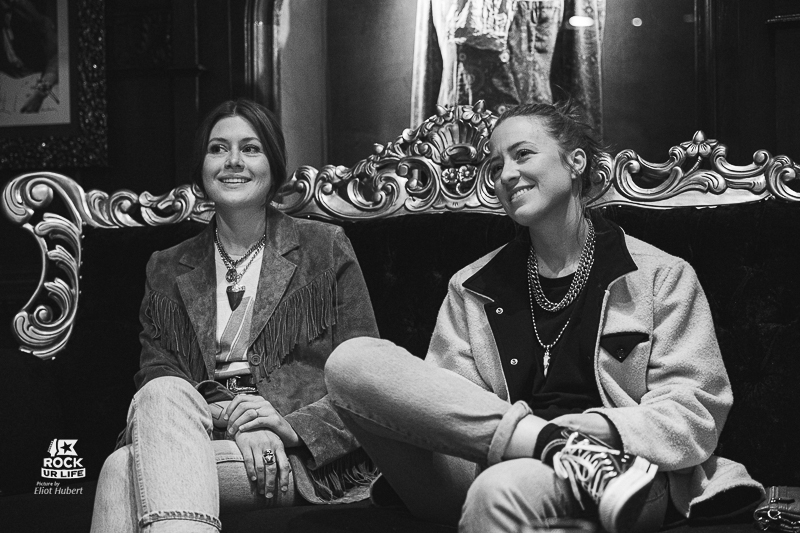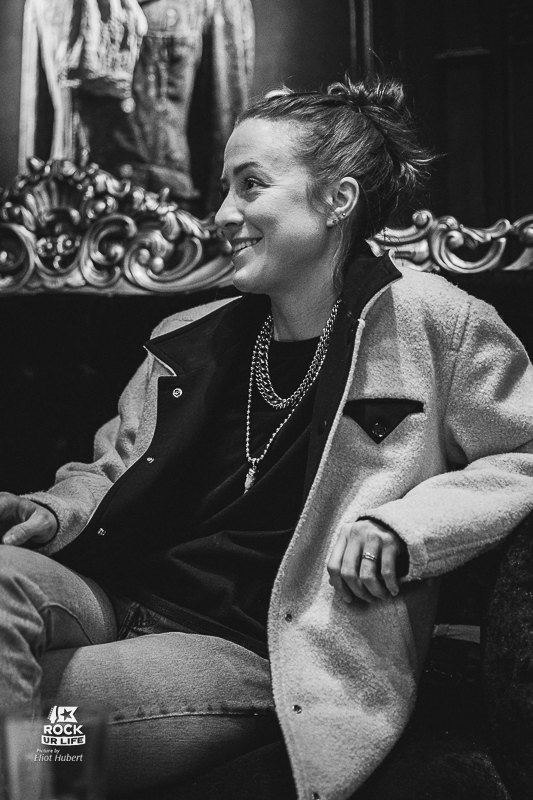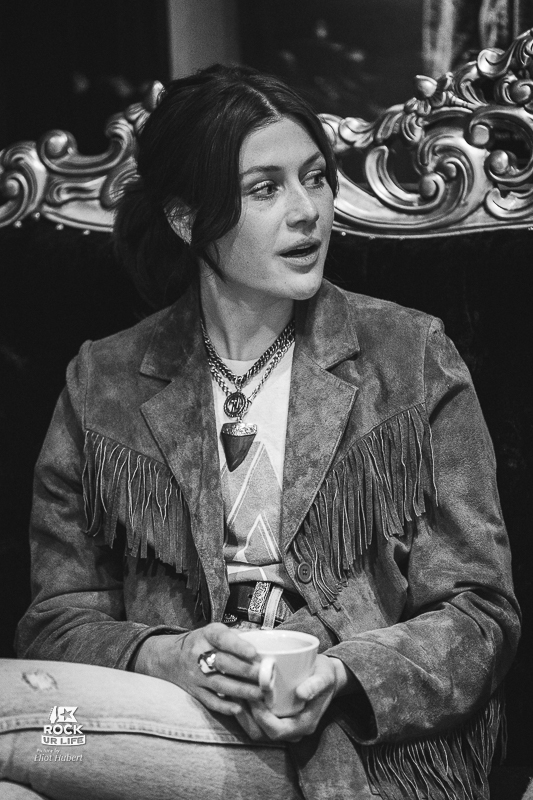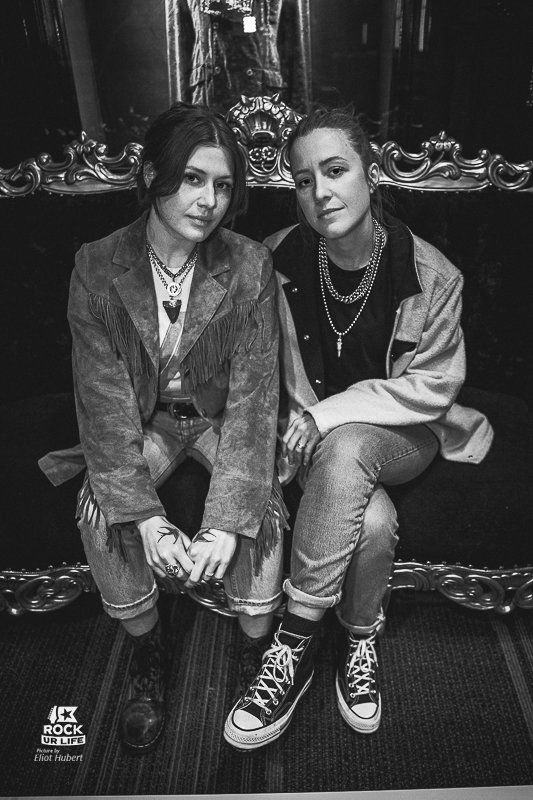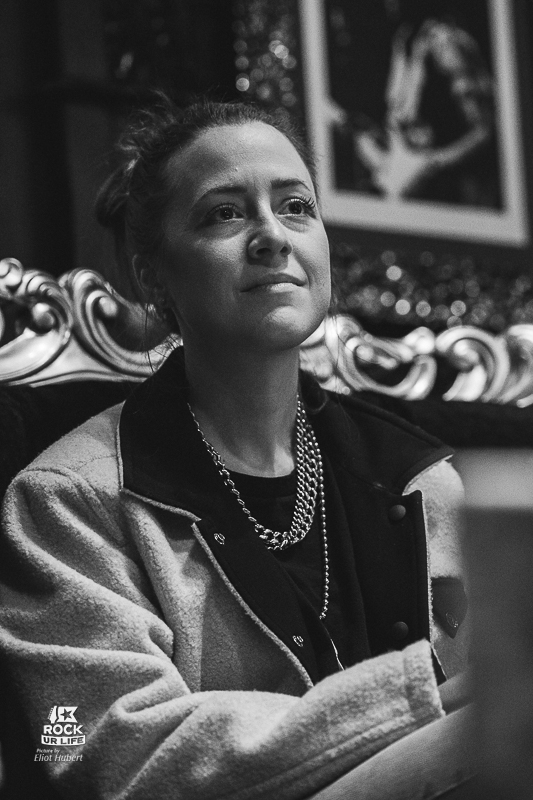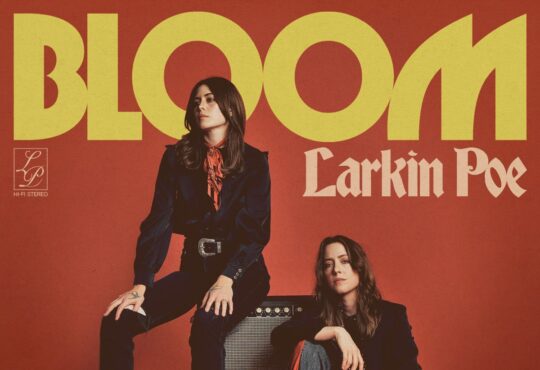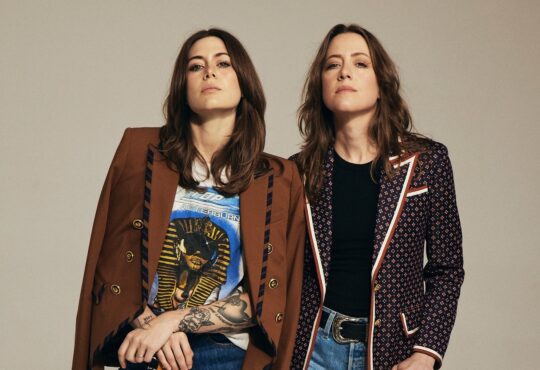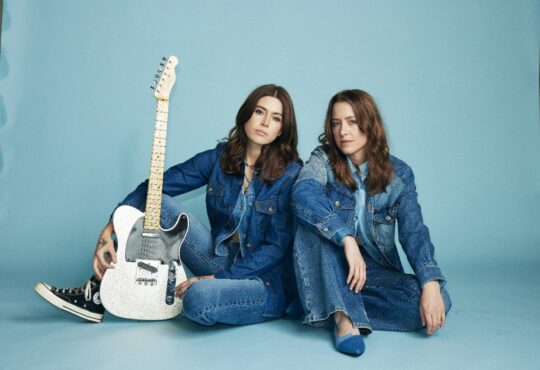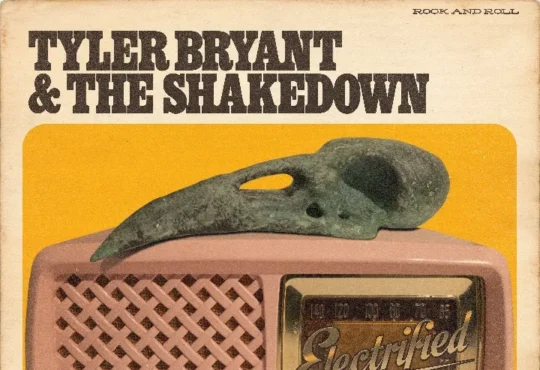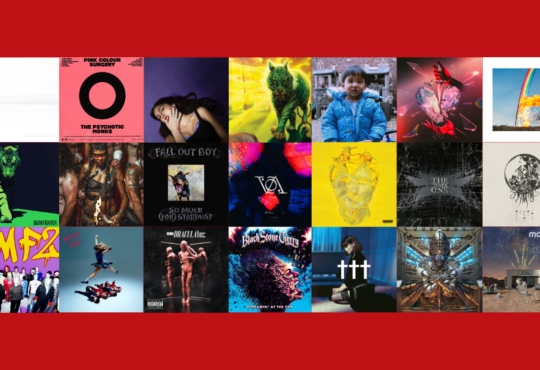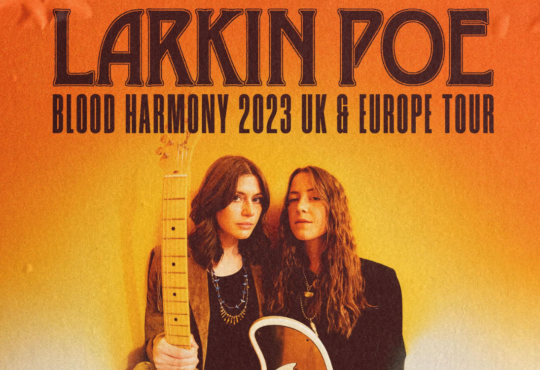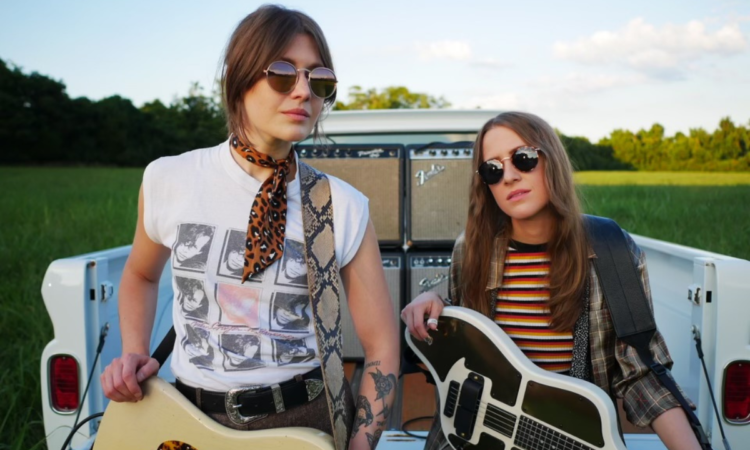
The Lovell sisters are back! Rebecca and Megan from Larkin Poe release their new album Blood Harmony. Discover more now!
Hello Rebecca and Megan! How’s the promo trip to Paris?
Rebecca Lovell: It’s been amazing. I think it’s very humbling to have so many nice people ask us thoughtful questions about our music. And it’s not something that we take lightly.
Is this your first full promo day in France?
Rebecca: Yeah, I mean, we’ve come through for shows, we’ll be able to meet up with people and have one or two interviews. But to be able to come over for the express purpose of giving our French fans the energy that they deserve. Because we have an incredibly strong contingency of support here in France, and we really want we want to give back and be available to answer whatever questions people have, because you guys have been collectively very supportive.
You’re also in Paris to shoot for the French TV show Taratata. You already done TV performances in the past. How do you approach this gig, since it’s also a great opportunity to reach more people on TV? And not only in a concert venue. How do you manage this difference? Between TV and being on stage.
Megan Lovell: To be honest, try not to handle it any differently. It’s just a regular gig. And you go to it. And that’s a good way to kind of dispel of nerves. But honestly, I think because we, throughout the years throughout the last 12 years of being a band, like we’ve been put in every single situation you possibly could have been put into. I feel thankful for that, because it actually gives us that kind of a bulletproof vest for nerve wracking things, and high pressure gigs, where it’s like ‘okay, whatever.’ And now, you kind of have to approach it like that. And let’s connect with the people in the room that actually makes it a lot more fun when there are people there listening. It’s much more sterile if there are no people in the room or just a camera, you know, a guy with a camera is like, ‘what am I supposed to,’ there’s nothing to interact with. And this will actually have an audience.
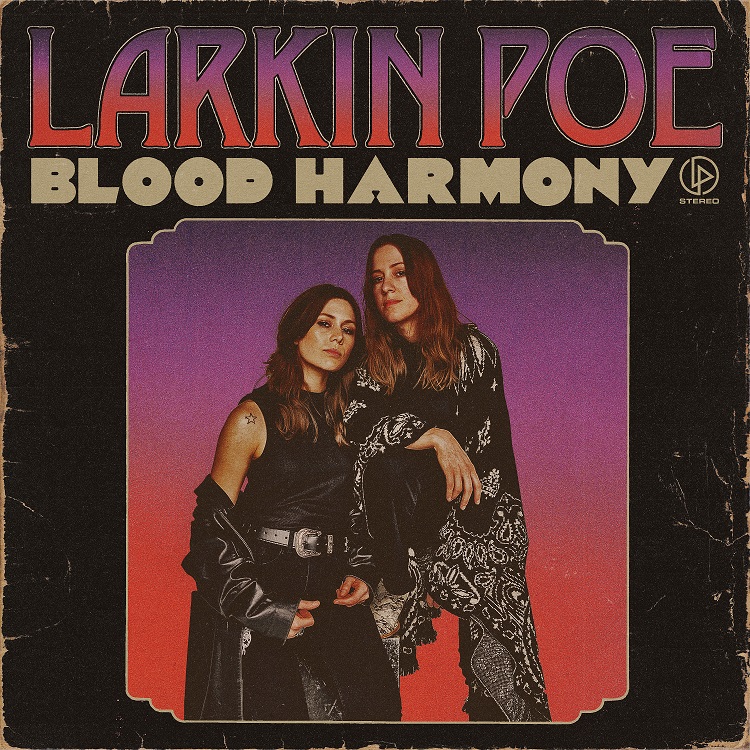
You will release your new album Blood Harmony next month. So the title is related to family history, let’s say about the book. How did it end up as the inspiration for this new album and the title of the album?
Rebecca: Being sisters is of course, like the biggest theme around which everything that we do as a band revolves our family bond our musical connection, the way that we write the stories that we tell, so to be able to not only have the band name, have family significance, but to find ways in which we can weave the authenticity of the band, into the music, into the fiber of what it is that we do that feels very important, and authentic. And it’s also like, the longer that we’ve been a band the easier it feels as well. It feels easy to relax into knowing who we are and what we’re about.
Through the songs, but also on stage, you like to share stories, referring to your musical tastes, your life, and your roots, which stories are on this new album Blood Harmony? Is that also the way you see music, like sharing stories, experiences, feelings?
Rebecca: Yeah. I feel like maybe we should pick different songs like I do think that ‘Southern Comfort’ is the definite story song, in today’s events, you said something that felt very poignant. One of the themes that we returned to a lot in our storytelling is our place of home. Like we write a lot about where we come from, and the musical and cultural significance of having grown up in Georgia and Tennessee. And I think that in large part is something that crops up a lot for us, because in our lives, we have spent so much time away from home. Because we started touring when we were 15/16 years old. That means the majority of our year is spent thinking with a sense of homesickness, of where we come from, and missing our family. So it makes actually a lot more sense as to why that is a theme that appears a lot in our storytelling. I think that it’s significant to find the courage to write from personal experience, because it allows you to hopefully, find resonance with other people, because the human experience, while we are all different and unique individuals, I do think there’s a common thread that connects us all. And one of the things that I treasure most about traditional American music, and specifically blues, is the timelessness quality to the lyrics, the fact that the issues being discussed in the blues: sense of isolation, sense of heartbreak, sense of joy of a new car, like stuff that everybody can relate to. It’s simple stuff. So I would try at the end of the day to just write songs about simple stuff that can hopefully spark a little sense of understanding.
Megan: Like ‘Georgia Off My Mind’, the idea of moving from one place to the other, and the bittersweet feeling of feeling like you’re leaving home, but hopefully creating a new home. That’s like a feeling that probably most people have experienced. And I do think that the joy of music is particularly when thinking about traditional music. It’s an oral history, it’s like these stories being passed down by word of mouth. And people passing their stories from one person to the next from one generation to the next. I like to think a song like deep states down kind of harkens back to, maybe like a mountain music ballad. You know, it’s kind of in the tradition of some of those old tunes that we hear. What’s very interesting is some of those old ballads. You hear the same songs, or it’s just parts of it, it’s like a chorus that will be in, in mountain music and bluegrass, and then you’ll find the same chorus in a blues track. It’s almost like these were two genres that were kind of intermingling but not quite. So there’ll be like a chorus that is the same in the blues song, but the verses are different. And then you’ll find that same chorus over here in mountain music. But then the rest of the song is different, but there’s just this one piano stays the same. So then you can see the light trickledown effect, where somebody heard it from somebody else. And then maybe didn’t know the rest of the song. So they invented their own. And I kind of love that it’s a way for us to borrow from each other.
Rebecca: Yeah. Oh, I love that. And I think as you were saying that I thought to Bobbie Gentry, Billy Joe McAllister in the country tradition of telling part of a story but not telling you everything, which I find very intriguing.
Megan: I think ‘Deep Stays Down’ kind of hints at something being a little bit wrong, like something happens, something’s up, but you don’t really know.
Were you ever tempted to try and write on other stuff, or it is really about the core of your musical roots? All of those, I mean, feels natural to you. But did you ever force yourselves to try something else? Or you just can’t, it’s like ‘this and that’s it‘.
Megan: I’m just doing a lot of experimentation throughout the years. And sometimes those songs wouldn’t even come out. Like we would try something and then it wouldn’t necessarily sound like us. But definitely we’ve written in a lot of different stuff. I mean, there’s been some like, crazy stuff. Like almost trying to bring in some like hip hop stuff into it in bluegrass, constrained country.
Rebecca: But there is a season for everything as well. And I think that that’s one part of being patient in artistry is allowing yourself to continue to mature and to be open to new inspirations that come knocking, so who’s to say what record we’ll make next? You never know.
There are the lyrics and the themes, but there’s also the music. There’s really not a secret answer to this but: what’s your secret formula to write great songs? Is it more about the rhythm, the melody, the chorus, all of those, or just no limits and try anything?
Rebecca: I love the prerequisite is that it’s going to be a great song. Because I don’t know. I mean, we’ve written some good songs we haven’t made, maybe we’ve written some good good songs. But we’re still working on the great songs piece. I feel like that’s, um, that’s the long term goal.
Megan: But we have discovered, maybe it’s not a secret, but it kind of felt revelatory to us, that when we’ve been doing this cover video series. A great song stands on its own, like, it doesn’t need production. It doesn’t need bells and whistles. It’s just some insightful lyrics or lyrics that makes you feel something with a melody that makes you feel something, and maybe some chords that make you feel something and now, and so we, when we were approaching this album, we thought, why don’t we approach our own songs as if they were a cover video. Just sit down just the two of us. Simple, just guitars and voices, and see if the songs can stand on their own. And if they can’t, it probably means they need to be worked on a little bit more. So all of the songs that ended up going on the record were ones that stood on their own for us to play by ourselves.
But Rebecca what you’re saying, the comparison between a good song and a great song. As an artist, when you’re releasing an album, you only have great songs, and then the audience decide if it’s really great, or just good or average. So it’s actually quite funny that it’s like only good song.
Rebecca: I don’t want to have a false sense of modesty. Because I think sometimes that’s like a learned behavior of like, sort of taking falling on your own sword before someone else chops your leg off. You know what I mean? Like, no, don’t do it. Don’t do it. I got this. But I do think beauty is in the eye of the beholder. And so it’s not even necessarily up to me to determine if it’s a great or a good song, I have to write to the best of my ability and then let it, let the chips fall where they may like I think it’s rain. Rainer Maria Rilke who said, you know, as an artist, your job is to do the work, you do not have license to try and control or expect anything from the work that you do. You can only do your work and then put it out into the universe and then move on.
Megan: Because as an artist, that’s not our last record.
Rebecca: It’s not a last record. Yeah, it’s like a step in the journey. And that’s kind of nice, you know.
Megan: It kind of relieves some of the pressure, like we really don’t have expectation for this record, other than we just hope that it connects with people. It’s like, that’s all that we really, really hope for it. Yeah. People find some solace or entertainment.
A word about the whole production. So your husband, Tyler Bryant produced it, do you feel like it impacted a bit your sound? We found the record a bit more organic, and some sounds are a bit more dirty than usual.
Rebecca: First off, I would say he did not produce it. He was brought in to co-produce it. (laughs) And Tyler is a very highly evolved man. And I do respect him because he knows how to be supportive of strong women. And both my sister and I are very opinionated, and very strong.
Megan: What you said about it was what we were intending for it. And so we wanted it to more accurately represent how we are live, which is energetic, raw, and like fun. And we felt like it was time to bring that more into our record. And for a while we were very insular, we played all of the instruments, Rebecca programmed the drums and like we did it ourselves. And that’s good. And I think that allowed us more developed why is that we were looking for, but then now that we know what we’re looking for. We can bring more people into the project and we want to Tyler to be involved because we knew we wanted live drums but we didn’t know exactly how we wanted to incorporate live drums, if we want it to be partly live partly programmed or have all live like we didn’t really know. And so he was like, hey I can help with that. Like he has been developing his studio developing his mic situation like it’s all built out and it’s beautiful home studio, so it was the perfect place to experiment. And so he came in and helped with all of the base track. Then we took all of that and we went to our good buddy Roger Alan Nichols’ studio. And then he helped us accomplish the rest of the guitar tones and the vocals.
Rebecca: Tyler is one of my favorite musicians and my favorite artists. I think the impact that he has had on us, and more specifically me is, I mean, it’s huge. Like he and I have been musical buddies for, you know, 7/8 years at this point. And that has had so much more impact and even whatever role he played as a sonic architect on this record, you know, but it is getting to make music with family is the most rewarding thing. And so getting to expand that, that lens focus and incorporate Tyler and incorporate Megan‘s husband, Mike Seal, who is a phenomenal guitarist and keys player, and to bring in our bandmates from off the road to record and to bring in Caleb Crosby from Tyler Bryant & The Shakedown. All of that just really speaks to our sense of family and belonging and home in a way that is very authentic.
That was exactly the second part of our production question. It was about the drums because we know that on some of the previous records, you use samples also for the percussions or synthetic sounds. And we were just wondering if it was a natural evolution of what you wanted to produce and have on an album, or just let’s do it, like the Shakedown, where you know, because you have the drums, etc.
Rebecca: Well, no, I think that, yeah, The Shakedown is a great rock and roll band. But the concept of making a live album is technically that harkens to the 60s and 70s that harkens to you know, to bands that are doing their best to preserve the humanity in their records, because I think the studio can be a very highly pressurized environment. And it can be a very sterile environment. And that’s the biggest difference, I think, in the personas that one might have onstage versus in the studio. So for us, we were very much self-aware in that how we are on stage is very different than how our records have sounded. We wanted to reduce that gap. We want our album to sound like we stand on stage. But it takes a little bit of courage to believe in yourself. And so you know, let it be what it is to let it all hang out. You know, and to be like, we don’t need to double stack guitars, one guitar spine, we’re gonna have a guitar, a lap steel, we’re gonna have drums, we’re gonna have bass, we’re gonna have vocals, because that’s what Larkin Poe sounds like. It’s good. It doesn’t need any extra shit. Like, just let it go.
You’re independent artists with your own label since a few years. Does that decision make sense today? Was it a good choice? Was it the right path to choose in your opinion?
Megan: Yeah, it’s been one of the best decisions I think we’ve made. Because it’s allowed us to really take the reins. And it’s hard to explain, you know, I think that it’s allowed us to serve the fans. And, and for us, that’s what makes us is the fact that we really have a dedicated fan base. And being able to call the shots. And able to tell what it is how we can work together, and able to know it and go for it without having to answer to somebody else. We know what we need to do. We know what people would want. Yeah and we’re able to give it back.
Rebecca: I would also say like you when you said business, you sort of like made a gesture like, like that might be a little bit of a dirty word. And I don’t know that. I think that because historically, and I don’t have any beef, with the recording industry at large. But I do think that there have been unsettling trends in which artists have been separated from the real world. They’ve been separated from the business. They’re isolated in this little tiny box in which they can find themselves in positions of isolation and disconnect from the impact they’re having. And that can turn into unhealthy behaviors where, you know, you turn to substance you turn to relying on someone else to just deal with all the business and you’re removed. And in turn, that’s unhealthy behavior where you’re gonna have financial abuse taking place, Elvis Presley, Amy Winehouse situations that aren’t healthy or good for the artist. So I think being able to be in the driver’s seat of your business and to engage with the budgetary concerns with what it means to accept or turn down certain opportunities to be aware of the ramifications of the decisions you’re making. I think it’s really healthy. It’s been healthy for us at least. And I’m very grateful to be able to have a diverse set of skills, that that allow us to rely on ourselves and each other.
Megan: More pressure 100%. But that pressure makes it more fulfilling, because what you really have an appreciation for what is happening. It’s like ‘oh, my goodness, all of this stuff‘, not to say we actually have a team around us, that helps us a good bit. So not to usually not to say that we’re doing everything because we’re clearly not like there we have a management team that has been very, like willing to take on running a label with us, which is not nobody would do that.
Rebecca: It takes a village, but I think it’s great.
Before the last question, just a word about your album covers. Once again you’re on the cover. But what about this Black Sabbath vibe? What’s the…
Rebecca: (laughs) Cheers man, thank you for finding the reference, you know, and it is, we’ve actually talked at great length about being on the cover. And we both I think would prefer to not be on the cover. But we’re also self-aware enough to know that as an artist in today’s industry, you got to take every shot you can to get people to pay attention, and people will look at a picture of us and be like, ‘I’m curious,’ then who are we to turn that down? Like we’re not so entitled to not be like.
Megan: It is a competitive world out there.
Rebecca: And we’re okay with it. We get familiar like a good picture or pictorial representation or some shit but also that like, it’s so artsy fartsy it’s like, at a certain point, like if AC/DC can be on like the majority of their covers on like, do whatever, that’s fine. But yes, the styling and the logo, it’s very reminiscent of the 70s. It’s what we’d like to say. It felt nostalgic, it feels like if Fleetwood Mac and Led Zeppelin and Black Sabbath had a baby. And this is the album cover and the logo.
Doing all of those promos, any question you’d like us to ask you?
Megan: About every question that you could be asked. And it’s always so interesting to hear this perspective of others, and also for it to be more of a conversation. But I think it’d be interesting to be asked more questions that maybe speak to us as individuals outside of music.
Rebecca: What we’re thinking like, if you were to go out to a bar with your friends, like, what are you asking your friends, you know, and oftentimes, we don’t get asked questions like that in interviews. And not that that I mean, people aren’t interested in being our friends, they are interested because we make music. But I would say Megan, what’s your favorite TV show right now?
Megan: TV show, I haven’t really been watching.
Rebecca: Brooklyn Nine-Nine, come on!
Megan: I do love Brooklyn Nine-Nine, that and also, it was kind of like a companion on the last 7-week tour. Because towards the end of the tour, it was like, ‘oh my goodness‘, after such a long break with COVID like to go into a 7-week tour is quite a long tour. So in the last two weeks, I was like ‘okay, I need something‘ to kind of distract me in Brooklyn Nine-Nine was there for me.
What are the hardest and the easiest parts of touring? As you mention the tough ending of your tour.
Rebecca: The easiest parts of touring? The moments that we are on stage. Because you know what you’re supposed to do. You’re there in the moment you’re present. You’re very present in what you’re doing. Because you have to be. And I think the hardest part is just the physical. The physical traveling and being apart from family, but that’s what I think we get paid to do. We get paid to travel, it gets hard.
Megan: Moving your body from one place to another.
Rebecca: Yeah. And the older you get, the harder it gets, you know, like even today, I’ve been awake since 4 AM. Because my body clock is set to home time. And you’re just there in the hotel bed, like, ‘oh my God, what’s happening?’ But you know.
How hard was it after a two year break?
Rebecca: In some ways, it was easier because we were more rested than we’ve ever been. But in other ways, it was harder, because you suddenly had perspective and knowing how challenging the previous 10 years had been. You know what I mean, where it’s like ‘oh my God, we’ve been doing this‘.
Megan: I think a lot of artists kind of had mental breakdowns. Like I talked to a lot of people who had been road dogs. And when they had the break, suddenly you almost have this sort of a realization of what you’ve been doing. And I don’t mean to sound dramatic about it or anything, but I think it caught up.
But many people stopped working in the industry because of that.
Rebecca: Yeah, and you had a lot more time to reflect.
Megan: I did it. It was a very strange time, because we took a year off. And then it was to be able to be there for every holiday and be there for every birthday. That was really special. And of course you’ve missed the touring, miss getting to see people. But also it was hard to get kick started again. But once we did, it’s like ‘okay, we’re back on it. It’s all good. Yeah. All right‘.
And here’s the last question. We are RockUrLife so what rocks your lives?
Rebecca: I mean, right now, and for the last 6/8 months: jetlag has rocked our lives. It’s true. Yeah. Because we got in this morning, and it’s just sort of like, ‘oh boy, oh boy‘. So I think I would say my response jetlag. What’s yours?
Megan: It’s the 8th time we’ve made the flight over the water. I think my family rocks my life right now because I think that we’ve been missing them a little bit, because we’ve been gone essentially since April. So I think we’re probably, I’m probably missing a good bit.
That’s it. Thank you!
Website: larkinpoe.com



